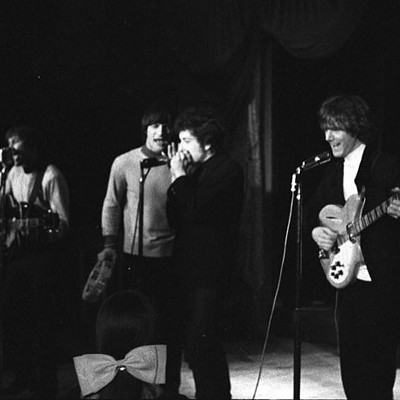Wednesday is the 65th anniversary of Franklin Roosevelt signing the Servicemen's Readjustment Act of 1944, better known to us as the G.I. Bill. Though the bill did many things, including unemployment compensation for veterans as well as home loans, it's probably best known for helping soldiers pay for a college education. In 2008, the bill was revamped to expand the benefits to the full price of any public college in the beneficiaries' home state, a housing allowance, and a stipend of $1,000 for books.
Most of us are aware of the sweet deal the U.S. government offers the brave men and women who risk being shot on its behalf, but you might not be aware of how much great music the world might have missed out on if the G.I. Bill hadn't passed. It's a pretty diverse group.
Johnny Cash: This is Texas, so we'll keep the description short. Johnny Cash is the country artist everyone from rappers to goths can get behind. The Man in Black epitomized tough living, hard songs and the quest for artistic solace right up till the end of his long career.
Cash started playing guitar in the as an airman in the U.S. Air Force, where he was stationed in San Antonio. An early version of "Folsom Prison Blues" was written during this period. Once he was out of the service, the G.I. Bill let him study broadcasting while playing in a country trio at night.
One year later, back in Memphis, Cash had his first hit record for Sun with "Cry Cry Cry."
Tito Puente: Without Tito Puente, Latin music in mainstream America might never have existed. The man recorded over 100 hundred albums over the course of his life, wrote over 400 songs, and netted four Grammys while he was at it. In addition to being a prolific composer and bandleader, he was also a famous percussionist on a variety of instruments.
In a bit of irony, Puente got his break when he was called upon to replace the drummer of the Machito Afro-Cubans who had just been drafted. Not long after, he himself was drafted and served in the Navy. Upon being discharged, the G.I. Bill let him study at the prestigious Juilliard School, and from there he became the reigning king of mambo.
Harry Belafonte: If Harry Belafonte wasn't such a fine humanitarian and artist, you could really hate his guts. He didn't even really want to be a singer; he just started singing in clubs to pay for acting classes. His first time singing in front of an audience, he was backed by the freakin' Charlie Parker band, which at the time also included Max Roach and Miles Davis. From there, he went on to be one of the most popular singers in the country in a time when being briefly touched by a white woman on a television performance almost got the whole episode of the show pulled.
Like Puente, Belafonte served in the Navy during World War II. Upon exiting, he worked as a janitor for a while until seeing a performance at the American Negro Theatre made him want to be an actor. He used the G.I. Bill to enroll in the drama department at the New York School for Social research, where his classmates included Walter Mathau, Marlon Brando, and Bea Arthur.
Like we said, you could really learn to hate this guy...
Dave Brubeck Brubeck may very well be the best jazz pianist in the world, and "Take Five" off his landmark album Time Out is one of the best known jazz standards in the world. At 90 years old he's still playing, and helps blaze a trail for young jazz artists through a variety of foundations.
Brubeck thought his older brothers would be the professional musicians in the family, and stuck to cattle ranching until entering college to study veterinary medicine. Eventually a professor convinced him that music was where his heart was at, and he moved into the music department. After graduating, he served in the army, and used the G.I. Bill to study at Mills College with Darius Milhaud.
Follow Rocks Off on Facebook and on Twitter at @HPRocksOff.






